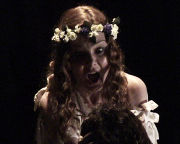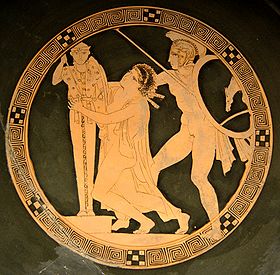Cassandra

In Greek mythology, Cassandra (Greek: Κασσάνδρα, "she who entangles men",[1] also known as Alexandra[2]) was the daughter of King Priam and Queen Hecuba of Troy. Her beauty caused Apollo to grant her the gift of prophecy. In an alternative version, she spent a night at Apollo's temple, at which time the temple snakes licked her ears clean so that she was able to hear the future. This is a recurring theme in Greek mythology, though sometimes it brings an ability to understand the language of animals rather than an ability to know the future.[3] However, when she did not return his love, Apollo placed a curse on her so that no one would ever believe her predictions. She is a figure both of the epic tradition and of tragedy, where her combination of deep understanding and powerlessness exemplify the tragic condition of humankind.

Contents |
History
Apollo's cursed gift became a source of endless pain and frustration. In some versions of the myth, this is symbolized by the god spitting into her mouth; in other Greek versions, this act was sufficient to remove the gift so recently given by Apollo, but Cassandra's case varies. From Aeschylus' Agamemnon, it appears that she has made a promise to Apollo to become his consort, but broke it, thus incurring his wrath: though she has retained the power of foresight, no one will believe her predictions.
While Cassandra foresaw the destruction of Troy (she warned the Trojans about the Trojan Horse, the death of Agamemnon, and her own demise), she was unable to do anything to forestall these tragedies since no one believed her. Coroebus and Othronus came to the aid of Troy out of love for Cassandra. Cassandra was also the first to see the body of her brother Hector being brought back to the city.
At the fall of Troy, she sought shelter in the temple of Athena, where she was violently abducted and raped by Ajax the Lesser. Cassandra was then taken as a concubine by King Agamemnon of Mycenae. Unbeknownst to Agamemnon, while he was away at war, his wife, Clytemnestra, had begun an affair with Aegisthus. Clytemnestra and Aegisthus then murdered both Agamemnon and Cassandra. Some sources mention that Cassandra and Agamemnon had twin boys, Teledamus and Pelops, both of whom were killed by Aegisthus.
In Aeschylus' Agamemnon
In Aeschylus' Agamemnon, the king, treading the scarlet cloth laid down for him, walks offstage to his sure death at line 972. After the chorus's ode of foreboding, time is suspended in Cassandra's "mad scene", which does nothing to advance the action in any way.[4] She has been onstage, silent and ignored. Her madness that is unleashed now is not the physical torment of other characters in Greek tragedy, such as in Euripides' Heracles or Sophocles' Ajax,[5] but she speaks, disconnectedly and transcendent, in the grip of her psychic possession by Apollo,[6] witnessing events past and future. "She evokes the same awe, horror and pity as do schizophrenics", an observer[7] has noted, "who often combine deep, true insight with utter helplessness, and who retreat into madness." Eduard Fraenkel remarked[8] on the powerful contrasts between declaimed and sung dialogue in this scene. The frightened and respectful chorus are unable to comprehend her. She goes to her inevitable offstage murder by Clytemnestra with full knowledge of what is to befall her.[9]
Greek and Latin sources
Homer. Iliad XXIV, 697-706; Homer. Odyssey XI, 405-434; Aeschylus. Agamemnon; Euripides. Trojan Women; Euripides. Electra; Apollodorus. Bibliotheke III, xii, 5; Apollodorus. Epitome V, 17-22; VI, 23; Virgil. Aeneid II, 246ff; Lycophron. Alexandra
Modern adaptations
A modern psychological perspective on Cassandra is presented by Eric Shanower in Age of Bronze: Sacrifice. In this version, Cassandra, as a child, falls in love with Apollo Oracle or Michael (archangel)
A similar situation occurred in Lindsay Clarke's novel The Return from Troy (presented as a reawakened memory), where a priest of Apollo forced himself upon Cassandra and was stopped only when she spat in his mouth. When the priest used his benevolent reputation to convince Priam that he was innocent of her wild claims, Cassandra subsequently went insane.
The myth of Cassandra is also retold by German author Christa Wolf in Kassandra. She retells the story from the point of view of Cassandra at the moment of her death and uses the myth as an allegory for both the unheard voice of the woman writer and the oppression and strict censorship laws of East Germany.

Author William Faulkner, in his novel Absalom, Absalom!, writes of Rosa Coldfield, a principal character in the Sutpen Dynasty/Tragedy, and how her "childhood ... consisted of a Cassandra-like listening beyond closed doors", alluding to both mythological concerns that (1) Cassandra was locked away, or behind closed doors (as with Rosa's youth), and (2) that Cassandra's prophecies were true, yet fated to be ignored (as with Rosa's premonitions about Thomas Sutpen and his desire to forge a dynasty).
The author Marion Zimmer Bradley wrote a historical novel called The Firebrand, which presents a story from Cassandra's point of view. Marcus Sedgwick's novel The Foreshadowing features a protagonist named Alexandra who has the gift of foresight, though she sees mainly others' pain and death.
In Clemence McLaren's Inside the Walls of Troy, Cassandra has a strong friendship with Queen Helen of Sparta when she came to Troy with Prince Paris. Cassandra essentially hates Helen but gives in to her unbearable joy and happiness and becomes Helen's "confidante". At the end of the story instead of Cassandra being raped and taken as Agamemnon's "battle prize", she simply joins her two sisters, Polyxena and Laodice, at the temple of Athena. The rest of her story is left untold.
In David Gemmell's Troy trilogy, Cassandra is credited with opening the mind of exiled Egyptian prince Gershom (Moses) to his own gift of prophecy. Cassandra got her gift after suffering from 'brain fever' as a young child, and dies in the volcanic eruption of Thera.
In Jacob Appel's comedy, Helen of Sparta, Cassandra conspires with Paris in the abduction of Helen.[10]
In the section Cassandra of Suggestions for Thought to Searchers after Religious Truth, Florence Nightingale protests the over-feminization of women into near helplessness, such as what Nightingale saw in her mother's and older sister's lethargic lifestyle despite their education. The work also reflects her fear of her ideas being ineffective, as were Cassandra's.
In Hercules: The Animated Series (presented by Disney), Hercules befriends Icarus and Cassandra at his local high school.
Modern usage
In more modern literature, Cassandra has often served as a model for tragedy and romance, and has given rise to the archetypal character of someone whose prophetic insight is obscured by insanity, turning their revelations into riddles or disjointed statements that are not fully comprehended until after the fact. Notable examples are the character of River Tam from the science fiction TV series Firefly, the character Cassandra in the TV series The X-Files (an alien abductee that nobody took seriously), the character of James Cole from the science fiction movie 12 Monkeys, and the science fiction short story "Cassandra" by C. J. Cherryh. Pop group ABBA recorded a song titled "Cassandra" about her. In the fifth series of the British reality television series The Apprentice, contestant Lorraine Tighe was frequently referred to as "Cassandra" by Margaret Mountford due to her difficulty in getting other team members to listen to her views. In Scream 2, Neve Campbell's character Sidney is attacked during a rehearsal of a stage performance of Cassandra where she plays the lead. This mirrors a frequently tragic theme of Sidney's character that she often warns those around her of the danger the killer poses but is frequently ignored. The character of Fiver in Watership Down can be considered as a classical allusion to Cassandra. Also in teen books the Secret Circle series by L.J. Smith, the main character Cassandra (Cassie) Blake who is told by her grandmother she has 'the sight' but not even her own kind can believe it sometimes.
See also
- Cassandra (metaphor)
- Apollo
- Apollo archetype
- Novikov Self-Consistency Principle
- The Boy Who Cried Wolf
- Tiresias
References
- ↑ This is Robert Graves' etymology.
- ↑ See Lycophron's poem Alexandra, which was about Cassandra.
- ↑ Compare Melampus; Athena cleaned the ears of Tiresias
- ↑ Seth L. Schein, "The Cassandra Scene in Aeschylus' 'Agamemnon'" Greece & Rome, Second Series, 29.1 (April 1982:11-16).
- ↑ Or descriptions of madness, such as that of Heracles in The Women of Trachis or Io in Prometheus Bound, two further familiar examples cited by Schein 1982:11.
- ↑ The chorus find her to be "crazed in mind and transported by a god" (Agamemnon, 1140).
- ↑ Schein 1982:12
- ↑ Fraenkel, Kleine Beiträge zur klassische Philologie , vol. I (Rome) 1964, 344-48, 375-87, noted in Schein 1982:11 note 6
- ↑ Analyses of the Cassandra scene are in Bernard Knox Word and Action: Eassays on the Ancient theatre (Baltimore and London: Penguin) 1979:42-55; and more briefly, in Anne Lebeck, The Oresteia: A study in language and structure (Washington) 1971:52-58.
- ↑ Ying, Ted. Review of Helen of Sparta
Further reading
- Clarke, Lindsay. The Return from Troy. HarperCollins (2005). ISBN 0-00-715027-X.
- Marion Zimmer Bradley. The Firebrand. ISBN 0-451-45924-5
- Patacsil, Par. Cassandra. In The Likhaan Book of Plays 1997-2003. Villanueva and Nadera, eds. University of the Philippines Press (2006). ISBN 971-542-507-0
- Schapira, Laurie L. The Cassandra Complex: Living with Disbelief: A Modern Perspective on Hysteria. Toronto: Inner City Books (1988). ISBN 0-919123-35-X. (This work is mentioned in the Cassandra (Metaphor) page in the Wiki.)
Primary sources
- Virgil, Aeneid II.246-247, 341-346, 403-408
- Theoi Project: Cassandra, classical sources in English translation
|
||||||||